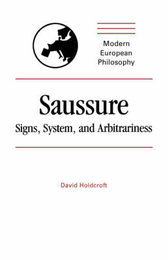
|
Saussure: Signs, System and Arbitrariness
Paperback / softback
Main Details
| Title |
Saussure: Signs, System and Arbitrariness
|
| Authors and Contributors |
By (author) David Holdcroft
|
| Series | Modern European Philosophy |
|---|
| Physical Properties |
| Format:Paperback / softback | | Pages:196 | | Dimensions(mm): Height 215,Width 137 |
|
| Category/Genre | Western philosophy from c 1900 to now |
|---|
| ISBN/Barcode |
9780521339186
|
| Classifications | Dewey:410.92 |
|---|
| Audience | | Tertiary Education (US: College) | | Professional & Vocational | |
|---|
| Illustrations |
20 Line drawings, unspecified
|
|
Publishing Details |
| Publisher |
Cambridge University Press
|
| Imprint |
Cambridge University Press
|
| Publication Date |
26 April 1991 |
| Publication Country |
United Kingdom
|
Description
The Swiss linguist Ferdinand de Saussure (1857-1913) has exerted a profound influence not only on twentieth century linguistics but on a whole range of disciplines within the humanities and social sciences. His central thesis was that the primary object in studying a language is the state of that language at a particular time - a so-called synchronic study. He went on to claim that a language state is a socially constituted system of signs that are quite arbitrary and that can only be defined in terms of their relationship within the system. This new perspective has changed the way people think about linguistics and has led to important attempts to apply structuralist ideas in anthropology, literary criticism, and philosophy. Professor Holdcroft's book expounds and elaborates Saussure's central ideas. It also offers a critical assessment of them, arguing that many of Saussure's claims are either questionable or have been misunderstood.
Reviews"[Holdcroft's] book, which will disturb orthodox Saussureans and invigorate critical ones, deserves to become the lightning rod foor a new wave of Saussure commentary aimed both at upsetting and furthering its conclusions." Language "A concise, clear and sophisticated critique of Saussure's thought, this small book should do much good." Times Literary Supplement
|